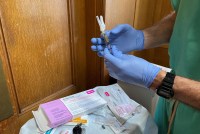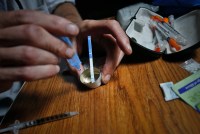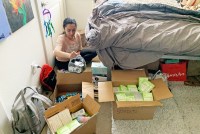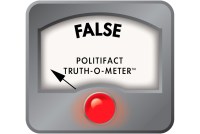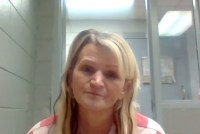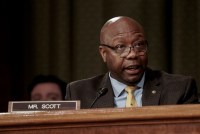Latest KFF Health News Stories
Can a Monthly Injection Be the Key to Curbing Addiction? These Experts Say Yes
In California, where overdose deaths are on the rise, physicians say administering anti-addiction medication as a monthly injection holds tremendous potential. So, why aren’t more patients getting it?
KHN’s ‘What the Health?’: Leaked Abortion Opinion Rocks Washington’s World
The unprecedented early leak of a Supreme Court draft opinion that would overturn the landmark abortion-rights ruling Roe v. Wade has heated the national abortion debate to boiling. Meanwhile, the FDA, after years of consideration, moves to ban menthol flavors in cigarettes and cigars. Joanne Kenen of the Johns Hopkins Bloomberg School of Public Health and Politico, Shefali Luthra of the 19th, and Jessie Hellmann of CQ Roll Call join KHN’s Julie Rovner to discuss these issues and more. Plus, Rovner interviews KHN’s Paula Andalo, who wrote the latest KHN-NPR “Bill of the Month” episode about a family whose medical debt drove them to seek care south of the border.
As Overdoses Soar, More States Decriminalize Fentanyl Testing Strips
Georgia may soon join a growing list of states decriminalizing the use of fentanyl testing strips. Bans of the strips — on the books in about half of states, experts say — stem from laws criminalizing drug paraphernalia adopted decades ago. But the testing devices are now recommended to help prevent overdose deaths.
Medicare Surprise: Drug Plan Prices Touted During Open Enrollment Can Rise Within a Month
Even the savviest Medicare drug plan shoppers can get a shock when they fill prescriptions: That great deal on medications is no bargain after prices go up.
Emergency Contraception Marks a New Battle Line in Texas
In the shadow of Texas’ austere abortion regulations, grassroots organizers employ stealth tactics to help young women get emergency contraception.
Journalists Cover the Gamut, From Rising Insulin Costs to Delays in Autism Care for Children
KHN and California Healthline staff made the rounds on national and local media this week to discuss their stories. Here’s a collection of their appearances.
US Rep. Gaetz’s Diagnosis of What’s Driving Insulin Costs Misses the Root Cause
A diabetes diagnosis is not always related to a person’s weight or overall health, especially for those with Type 1 diabetes, who are dependent on insulin treatment for life.
Is My Drug Copay Coupon a Form of Charity — Or a Bribe?
Drug copayment assistance is a form of profitable charity — and, yes, that’s an oxymoron. Amid skyrocketing drug prices, it’s understandable that patients desperately need help affording medicine, especially when their health is on the line. But these programs create a mirage that perpetuates our health care system’s reckless spending.
Why Cheap, Older Drugs That Might Treat Covid Never Get Out of the Lab
The hydroxychloroquine and ivermectin fiascoes have soured many doctors on repurposing drugs for covid. A few inexpensive old drugs may be as good as some of the new antivirals, but they face complex obstacles to get to patients.
Journalist Puts in a Plug for Better Sleep Cycles During the Pandemic
KHN and California Healthline staff made the rounds on national and local media this week to discuss their stories. Here’s a collection of their appearances.
Readers and Tweeters Sound Alarm Over Nurse’s Homicide Trial
KHN gives readers a chance to comment on a recent batch of stories.
A Travel Nurse Leaves Fears of Hospital Drug Tampering Across Three States
Kentucky nurse Jacqueline Brewster is accused of tampering with opioids in Tennessee and West Virginia, possibly contaminating drugs given to hospital patients.
Journalists Discuss Insulin Costs and Ethical Questions Surrounding a North Carolina Rehab Program
KHN staff made the rounds on national and local media this week to discuss their stories. Here’s a collection of their appearances.
California Handed Its Medicaid Drug Program to One Company. Then Came a Corporate Takeover.
The company awarded the state’s Medi-Cal Rx contract was taken over by another company, Centene. That left the state with a contractor it didn’t pick — one that has been accused of overbilling nine other state Medicaid programs and is now under investigation by California.
KHN’s ‘What the Health?’: Finally, a Fix for the ‘Family Glitch’
President Joe Biden welcomed former President Barack Obama back to the White House this week to announce a new policy for the Affordable Care Act that would make subsidies available to more families with unaffordable employer coverage. Meanwhile, Congress struggled to find a compromise for continued federal funding of covid-19 vaccines, testing, and treatments. Tami Luhby of CNN, Shefali Luthra of The 19th, and Jessie Hellmann of CQ Roll Call join KHN’s Julie Rovner to discuss these issues and more.
Despite Doctors’ Concerns, Pharmacists Get More Leeway to Offer Treatment With Testing
In the battle against covid, pharmacies became a key place for consumers to seek vaccines and testing. Some states are expanding pharmacists’ work to include directly prescribing drugs for customers who seek some routine, point-of-care tests, such as those for flu or strep throat. But doctor groups oppose the move.
At a Tennessee Crossroads, Two Pharmacies, a Monkey, and Millions of Pills
Prosecutors say opioid-seeking patients drove hours to get their prescriptions filled in Celina, Tennessee, where pharmacies ignored signs of substance misuse and paid cash — or “monkey bucks” — to keep customers coming back.
Big Pharma Is Betting on Bigger Political Ambitions From Sen. Tim Scott
The South Carolina senator led the congressional pack in pharma campaign contributions for the second half of 2021. There are clear reasons.
A KFF Health News database tracks campaign donations from drugmakers over the past 10 years.
Pfizer CEO Pushes Yearly Shots for Covid. Not So Fast, Experts Say.
A corporate CEO’s call for a fourth mRNA shot struck those closely watching the pandemic as self-serving. It creates public pressure for a fourth dose of vaccine before government experts have time to assess the evidence and settle on the best course forward.



